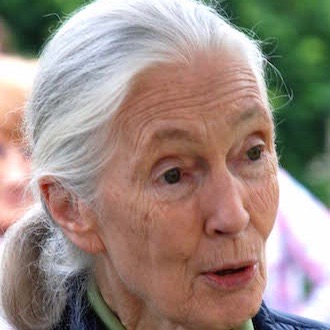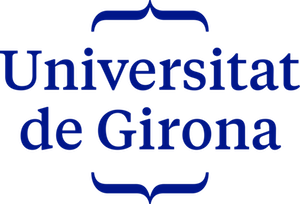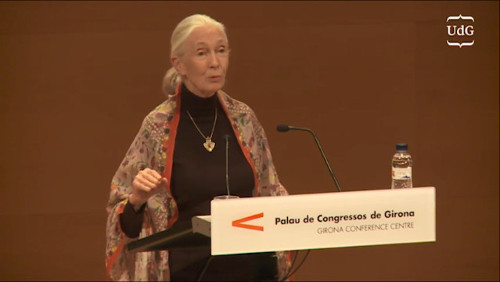
Jane Goodall
Dr. Goodall’s (1934, London) pioneering study of wild chimpanzees and their habitats, which began more than 55 years ago in Tanzania and continues today, has radically changed the way humans think about both chimpanzees and ourselves. Her innovative fieldwork methodology, understanding chimpanzees as individuals with minds, emotions, and personalities of their own, revolutionized scientific paradigms forever. Her discoveries about our closest living evolutionary relatives, beginning with their instrumental behavior, definitively transformed the definition of Homo sapiens.
After decades of research, tackling conservation challenges, and creating chimpanzee rescue centers and environmental education programs, Dr. Jane Goodall continues to work to protect biodiversity globally and promoting sustainability and peace among peoples, traveling 300 days a year around the world to share her long life experience and her message of hope: that each of us is important in making this world a better place.
Videos
Here you can watch the video of Jane Goodall’s conference presentation, given by Joan Vergés (Ferrater Mora Chair), Ferran Guallar (Jane Goodall Foundation Spain), and Olga Feliu (Mona Foundation).
You can also watch the Jane Goodall Institute’s documentary screenings about Jane Goodall, which she herself requested be shown before her lecture.
And finally, Jane Goodall’s lecture What I learnt from Chimpanzees.
Life and work
Dr. Jane Goodall remains fully active in promoting science and education and is recognized worldwide as one of the world’s most prominent scientific figures and one of the most outstanding conservationists and environmentalists.
Seen in historical perspective, it is fair to say that Goodall’s study of wild chimpanzees and their habitats, begun more than 55 years ago in Tanzania, has radically changed the way we think about chimpanzees and humans themselves. Her innovative fieldwork methodology (consisting of understanding chimpanzees as individuals with their own minds, emotions, and personalities) has revolutionized the way science is done in this field. Decades of research in the wild have yielded unique findings on chimpanzee ethology (tool making, feeding, social structure, distribution areas, mother-infant relationships) and have inspired hundreds of researchers to continue and expand not only their work in this and related areas, but also to become involved in the conservation of great apes around the world.
Jane Goodall Institute
The Jane Goodall Institute is a global nonprofit organization founded in 1977 by Dr. Goodall, whose mission is: “To understand and protect chimpanzees and other great apes and their habitats, and to inspire and empower people to make the world a better place for animals and humans in a healthy environment.”
Based on Dr. Jane Goodall’s scientific work and humanitarian vision, the IJG’s global objectives focus on:
- Non-invasive research on chimpanzees and other primates in their natural habitats, as well as in captivity, to improve their conditions;
- Education and public awareness through various initiatives such as the Roots & Shoots environmental program, with some 700,000 participants in more than 50 countries, which encourages young people to take action to protect living beings and promote understanding among all cultures;
- Conservation of species and the environment through the sustainable development of local African communities (sustainable agriculture, school scholarships, reforestation, family planning workshops, microcredits, health facilities, water wells, ecotourism, fair trade, among others), providing alternatives to destructive practices such as poaching, species trafficking, deforestation, pollution, and poor resource management. A compilation of the IJG’s work can be seen inthe following video
Press Releases
- Televisió de Girona (4/5/2016): Jane Goodall serà a Girona en una conferència de la UdG
- Diari de Girona (5/5/2016): La primatòloga Jane Goodall oferirà una conferència a Girona el 27 de maig (PDF)
- El Punt-Avui (5/5/2016): Jane Goodall, convidada a la Càtedra Ferrater Mora (PDF)
- ARA (12/5/2016): Goodall explicarà a Girona què ha après dels ximpanzés (PDF)
- Diari de Girona (13/5/2016): Habiliten dues sales més per seguir Jane Goodall a l’Auditori de Girona
- El Punt-Avui (16/5/2016): Omplen les reserves per escoltar Jane Goodall el dia 27 a l’Auditori (PDF)
- El Punt-Avui (26/5/2016): Més de cinc-cents inscrits a la conferència de Jane Goodall
- ARA (26/5/2016): Jane Goodall porta a Girona els ximpanzés
- ARA (26/5/2016): Benvinguda Jane Goodall
- Diari de Girona (27/5/2016): Segueix en directe la conferència de la UdG
- Diari de Girona (27/5/2016): Goodall: “Les xarxes socials ajuden a la conscienciació mediambiental”
- EcoDiario.es (27/5/2016): Goodall: “Algunos países europeos tratan a los refugiados como ganado”
- ElDia.es - Santa Cruz de Tenerife (27/5/2016): Goodall: “Algunos países europeos tratan a los refugiados como ganado”
- Diari de Girona (28/5/2016): (Portada: Goodall “Hauríem d’aixecar-nos i dir prou”) Jane Goodall: “Els consumidors tenim poder per fer front a les multinacionals” (PDF)
- El Punt-Avui (28/5/2016): (Portada: “Calen esperits indomables”) La Jane de Tarzan (PDF)
- Núvol (28/5/2016): Tarzan es va enamorar de la Jane equivocada
- Diari de Girona (29/5/2016): Jane Goodall mostra el seu suport a l’acampada en defensa dels refugiats
Campaign Moves from jungle
On the occasion of his visit to Girona, the University of Girona, through its Green Office, joined the Mobilize for the Rainforest campaign, installing mobile phone collection bins in all its faculties.
“Movilízate por la selva” is a mobile phone recycling campaign created by the Jane Goodall Institute Spain as part of its Roots & Shoots environmental education program, with the support of primatologist and conservationist Jane Goodall, winner of the 2003 Prince of Asturias Award, the 2015 International Catalonia Prize, and a United Nations Messenger of Peace.
The campaign aims to extend the useful life of our cell phones, while offering citizens a simple and free way to donate unused cell phones (whether they work or not), which will allow us to:
- reuse devices and reduce the unsustainable demand for their components
- recycle useful elements and properly dispose of toxic materials, preventing environmental pollution
- raise funds for projects supporting the development of Congolese citizens and for education and conservation programs in the Democratic Republic of Congo, such as the Tchimpounga Chimpanzee Rehabilitation Center. There, the Jane Goodall Institute cares for more than 150 rescued chimpanzees, the vast majority of which arrived in terrible condition after being confiscated from hunters, traffickers, or private individuals. The funds are also allocated to reforestation and chimpanzee conservation projects in Senegal, and to educational projects for children in the Republic










